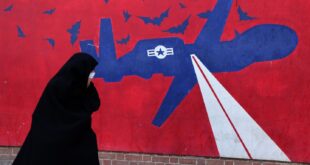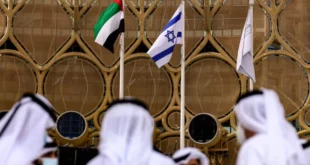 Arab papers splashed gory pictures of Lebanese children killed in Israel’s strike on Qana on their front pages Monday and warned that what some branded “a new Holocaust” could mark a turning point in the region.
Arab papers splashed gory pictures of Lebanese children killed in Israel’s strike on Qana on their front pages Monday and warned that what some branded “a new Holocaust” could mark a turning point in the region.
 “The tragedies in Qana suggest to the Lebanese that the Israelis, who are waging a campaign of ethnic cleansing in south Lebanon, have forgotten their own suffering during the Holocaust,” Beirut’s English-language Daily Star argued.
 In its deadliest attack since launching a massive air, land and sea offensive against Lebanon on July 12, Israel killed 52 people in air raid on Sunday, more than half of them children.
 “The children of the Holocaust, whom one would expect to show empathy for the plight of weak and helpless innocents, are now meting out the same racist rage that was demonstrated in (the Nazi death camps of) Treblinka, Auschwitz and Dachau,” the Daily Star added in its editorial.
 Gulf newspapers drew the same parallels and the Emirati daily Al-Khaleej went one step further, running a headline that read: “A new Holocaust in the Middle East.”
 “Barbaric”, “Massacre”, “Carnage” screamed two-inch blood-red headlines across the region, as editorialists appeared to be stuck for a stronger word that would convey the rage caused by Israel’s air strike on the southern Lebanese village.
 In Egypt, nearly all newspapers carried the same front-page picture of the dust-covered bodies of two little girls strapped to one stretcher as medics retrieved them from the rubble.
 The top-selling state-owned Al-Ahram charged Israeli Prime Minister Ehud Olmert was the worthy heir of Ariel Sharon – the comatose former premier nicknamed ‘the butcher’ for his role in the massacre at Beirut’s Sabra and Shatila refugee camps during Israel’s invasion of Lebanon in 1982.
 “Ehud Olmert is kicking off his career with a massacre that makes him a criminal of the same category as Begin, Shamir and Sharon,” Al-Ahram editorialist Mohammed Ali Ibrahim said.
 State-owned newspapers in Egypt, which has been at the forefront of Arab mediation efforts since the start of the offensive, had refrained from piling too much blame on Israel until the Qana raid.
 Israel launched its huge operation in Lebanon following the capture of two its soldiers in a border attack carried out by the Shiite militia Hezbollah.
 In Syria, which Israel accuses – together with Iran – of arming the Lebanese guerrilla group, newspapers vowed retribution for the attack on Qana.
 Pointing out that a similar and even deadlier raid on the same village 10 years ago had “remained unpunished”, Syria’s state-owned daily Tishrin warned that Sunday’s killing would not. “The punishment will come from the guns of the resistance,” it said.
 Many newspapers feared that the Israeli raid would only escalate the violence further but some saw potential for another kind of turning point in the region, arguing that the grisly strike may have turned the tide against Israel.
 “The sacrifice of the children of Qana has changed the international situation by reinforcing the chances of a ceasefire, around which almost all the international community has rallied,” Lebanon’s independent daily An-Nahar said.
 The Daily Star predicted that the torrent of international condemnation drawn by the strike could have lasting political effects.
 “The bombing… has triggered reactions that may be a turning point in the current fighting and perhaps even in the 58-year-old Arab Israeli conflict.”
 In Amman, the Jordan Times pointed out that “the only thing Israel has achieved is to create more enemies in the region and a sense of revulsion in the wider global community.”
 Editorialist Fathi Mahmud, writing in Egypt’s Al-Ahram, also argued that the shock of “the second Qana carnage could mark the beginning of the end of the campaign of mass murder perpetrated by Israel in Lebanon.”
 Eurasia Press & News
Eurasia Press & News


